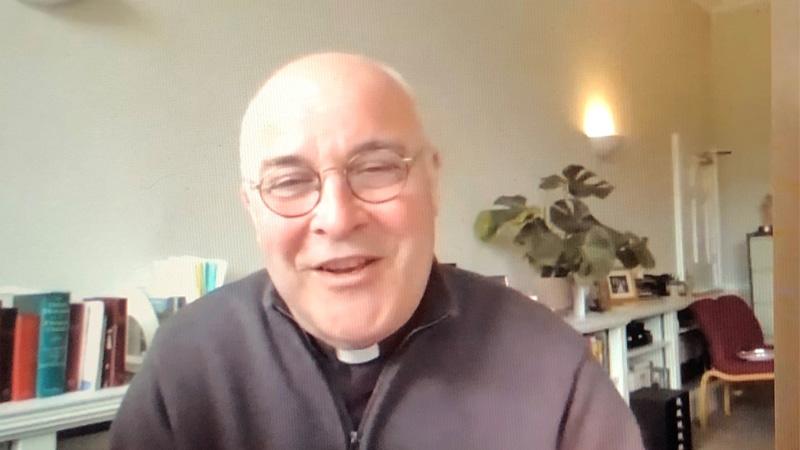Before choosing a life in the priesthood, the Archbishop of York Stephen Cottrell studied Media Communications at the University’s predecessor the Polytechnic of Central London. Following his enthronement this summer, Westminster’s Alumni Team spoke with Archbishop Stephen to find out about his first months in the role and how his time at Westminster prepared him for the job.

In the interview, Archbishop Stephen spoke about his time at university, and said: “When I began studying at the Polytechnic of Central London, I didn’t know quite where my career would go. I wasn’t brought up going to church. Back then, I was most interested in writing, film and media, and gave no thought to becoming a priest, let alone a Bishop or an Archbishop! But actually, as I look back now, I feel I’ve been in the communications business my whole life, because a major part of my work is communication – in all kinds of ways. So, some of the things I studied all those years ago have, in roundabout ways, really helped me.”
Despite his interest in the media, Stephen’s career in the film industry was short-lived, and soon after graduating in 1981, he had a call to follow a different path.
“I’ve always been a bit of a revolutionary,” he explained. “I was during my time at the Polytechnic and I still am. I want to change the world and I’ve come to learn that the best way of changing the world is changing the human heart. I believe that God can change hearts, and so I found myself becoming a priest.
“Once I got a ‘call’ to live life differently and take a different direction, it all happened rather quickly. I went back to college and studied Theology in Oxford, got ordained, and then I thought my life would be as a priest. I didn’t imagine much else, but to my surprise I was invited to be a Bishop, and later an Archbishop.”
The enthronement, or ceremony in which Stephen was promoted to Archbishop, took place in the summer. However, with all the restrictions in place this year, neither the service nor the months succeeding have been business as usual for the Church.
Talking about his experience being the Archbishop in 2020, he said: “Well, it’s been weird. One thing the Church is usually very good at is a grand do, and none of the big events have happened this year. But compared with what’s happening in the world, it’s a small thing.
“Meanwhile, the Church like every other organisation is facing huge challenges – financial challenges – as many of our income streams have dried up. But what has been wonderful is the Church being on the front line of offering care, and everywhere I turn I bump into incredible stories of wonderfully heroic things that ordinary people are doing in their communities.
“It’s this work with local communities that for me is the most enjoyable. The opportunity to write and speak, and the doors that open – really interesting doors open when you’re a Bishop and an Archbishop. And if you can use that, and be a voice for those who don’t have a voice, then that’s a great privilege.”
In order to keep in touch with the community, the Church, as with many organisations this year, has been forced to adapt and embrace new digital opportunities. Luckily for Stephen, exploring new platforms and media is something his degree equipped him with.
He added: “I remember when I first explored a vocation to the priesthood, the Bishop who I then went to see was extremely troubled by my CV. Because after I graduated, I worked for a short amount of time in the film industry, and most clergy didn’t come through that kind of world. The Bishop asked, ‘are you going to be showing films from the pulpit?’ I assured him that I wasn’t, but of course I am! Because just this summer the whole world has moved online.
“I could tell you story after story of churches who, say their Sunday congregation is 20 or 30 people, since moving online, they have 140 or more. So the congregation – the virtual congregation has grown massively. And that says something very interesting I think, that we are still learning from.”
Looking to future, Stephen has other ambitious plans of how to bring the Church into the 21st Century, and has set many goals of what he hopes to achieve while in the role: “I’ve set the bar of my expectation ridiculously high. I want the Church to be less anxious, less pompous; I’d like it to look a bit more like Jesus – to be simpler, humbler, and I would really like more people to come to Church. The decline of the Church has probably been overstated in the press; we’re not growing in number, but it has levelled off. People just come less often nowadays because of the way the world has changed. But that doesn’t mean any less commitment.
“Actually, a lot of people nowadays – young people especially – would describe themselves as spiritual but not religious. And I get that. I enjoy speaking into that and asking, when you say ‘spiritual’, what do you mean? Where do you think that comes from? How can we understand that more? I want the Church to be a place for people who are spiritual and not religious, to have a home; to come and explore Christian spirituality.”
Read the full interview on the University of Westminster Alumni blog.
Find out more about Media and Communication courses at the University of Westminster.


